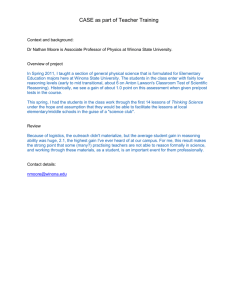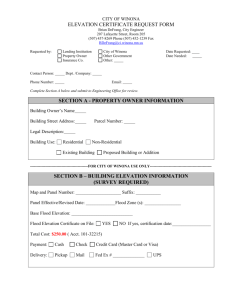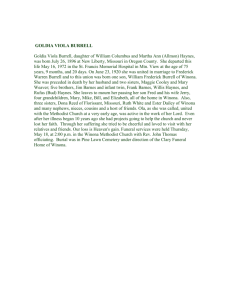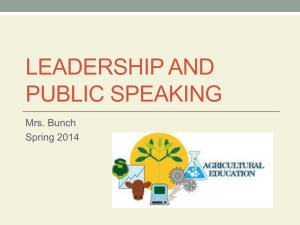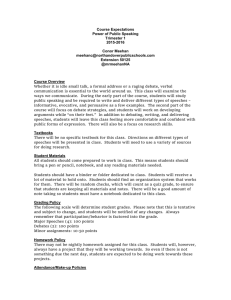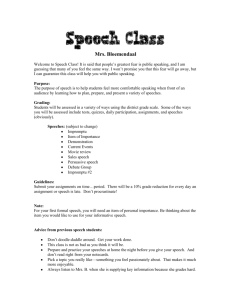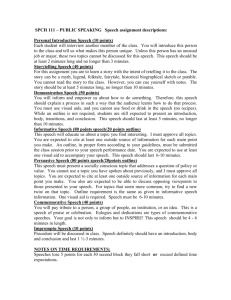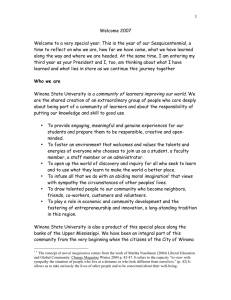CMST 192 – Introduction to Speech Communication
advertisement
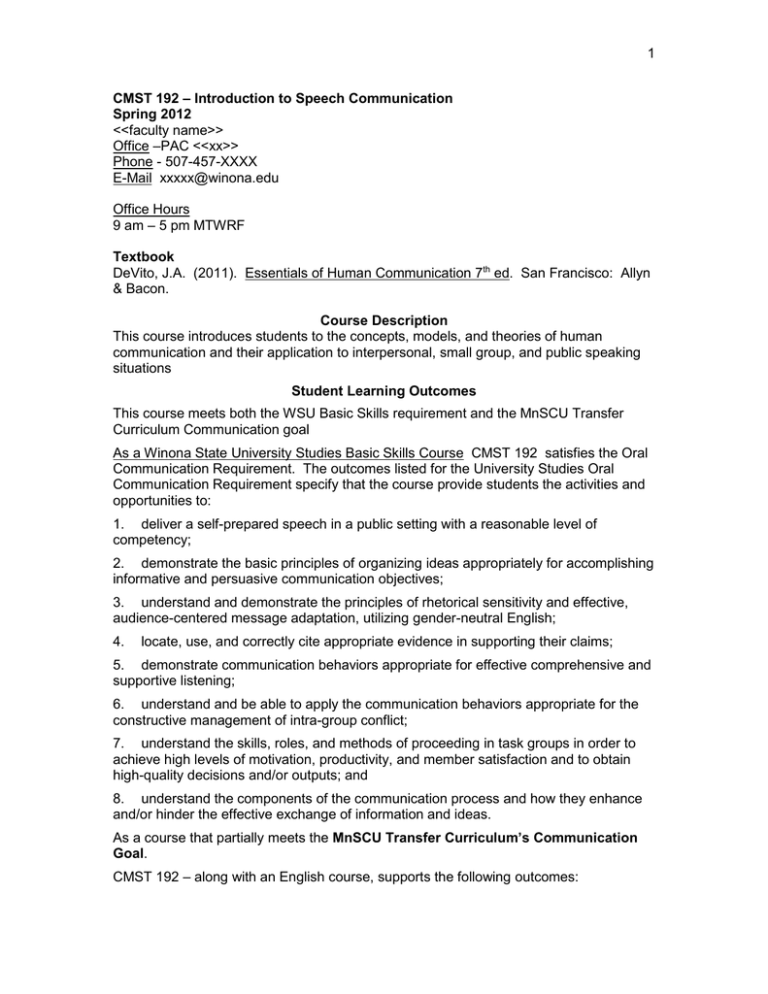
1 CMST 192 – Introduction to Speech Communication Spring 2012 <<faculty name>> Office –PAC <<xx>> Phone - 507-457-XXXX E-Mail xxxxx@winona.edu Office Hours 9 am – 5 pm MTWRF Textbook DeVito, J.A. (2011). Essentials of Human Communication 7th ed. San Francisco: Allyn & Bacon. Course Description This course introduces students to the concepts, models, and theories of human communication and their application to interpersonal, small group, and public speaking situations Student Learning Outcomes This course meets both the WSU Basic Skills requirement and the MnSCU Transfer Curriculum Communication goal As a Winona State University Studies Basic Skills Course CMST 192 satisfies the Oral Communication Requirement. The outcomes listed for the University Studies Oral Communication Requirement specify that the course provide students the activities and opportunities to: 1. deliver a self-prepared speech in a public setting with a reasonable level of competency; 2. demonstrate the basic principles of organizing ideas appropriately for accomplishing informative and persuasive communication objectives; 3. understand and demonstrate the principles of rhetorical sensitivity and effective, audience-centered message adaptation, utilizing gender-neutral English; 4. locate, use, and correctly cite appropriate evidence in supporting their claims; 5. demonstrate communication behaviors appropriate for effective comprehensive and supportive listening; 6. understand and be able to apply the communication behaviors appropriate for the constructive management of intra-group conflict; 7. understand the skills, roles, and methods of proceeding in task groups in order to achieve high levels of motivation, productivity, and member satisfaction and to obtain high-quality decisions and/or outputs; and 8. understand the components of the communication process and how they enhance and/or hinder the effective exchange of information and ideas. As a course that partially meets the MnSCU Transfer Curriculum’s Communication Goal. CMST 192 – along with an English course, supports the following outcomes: 2 1. Understand/demonstrate the writing and speaking processes through invention, organization, drafting, revision, editing and presentation. 2. Participate effectively in groups with emphasis on listening, critical and reflective thinking, and responding. 3. Locate, evaluate, and synthesize in a responsible manner material from diverse sources and points of view. 4. Select appropriate communication choices for specific audiences. 5. Construct logical and coherent arguments. 6. Use authority, point-of-view, and individual voice and style in their writing and speaking. 7. Employ syntax and usage appropriate to academic disciplines and the professional world Course Policies Attendance: I expect you at attend each class session. Please arrive on time. Repeatedly showing up for class late will result in a loss of points. It is your responsibility to get the information from a classmate you miss during an absence, including any assignments made during that time. I will not relecture during my office hours (I don’t have lecture notes.) Please see the policy below regarding attendance on speech days. If a situation arises when you must leave campus suddenly, be sure to contact the Dean of Students or Vice President of Student Development. They will help you contact your faculty members. Attendance on Speaking Days: Speaking days will be assigned well in advance of the actual speech. You must present on the day assigned, or trade for another day with a member of the class. If you must miss the speaking day, you (1) must submit your outline to me prior to our class meeting on your day you are scheduled to speak and (2) provide documentation of your absence from the WSU Dean of Students upon your return. You will still incur the 15 point missed–class-on-a-speaking-day penalty. Assignments Written work should be typed, double spaced, and stapled. Written assignments should evidence appropriate spelling, grammar, sentence and paragraph structure, and style. Late Work: All work is due at the beginning of the class listed in the syllabus (within the first 10 minutes of class). • Late work not be accepted. 3 If you are required to miss class on the day work is due, you must submit it early or send it with someone else. Class Participation: There will be plenty of opportunities for participation and students will be expected to engage in class discussions and activities. You will be exposed to many divergent views during this class, including ideas contrary to your own. You don’t have to agree with everyone (including me!), but you do have to be willing to listen. Electronic Devices: Please turn off your cell phones during class, as they will disturb other class members. If you have as pressing need to keep your phone on during class, let me know. Laptops should be put away unless required for the class. Please, refrain from texting, tweeting, facebooking, etc. during class. Incompletes: Incompletes require documentation for consideration and must be discussed with me in advance. If you do not arrange an incomplete, I will assume that you accept the grade you would be assigned given your total points at the end of the semester. Grade appeals: If necessary, appeals about grades must occur within one week after you receive the grade. All appeals must be typed and submitted on paper or via e-mail before they will be considered. Make sure that you carefully re-read the assignment and the grading criteria prior to making a grade complaint. Refer directly to the grading criteria in your complaint. Breaks: There will be several 5-minute break during each class period. Please return on time. Additionally, I will have structured activities during each class period during which time you may briefly excuse yourself if necessary. Please keep these informal breaks brief and infrequent. Exams: Graded exams will be reviewed in class, then collected. Students may review their exam in more depth with me in my office. No make-up exams will be given. Recording Speeches: All speeches will be digitally recorded. Extra Credit: No “extra credit” opportunities will be provided. Plagiarism Warning If you use the words or ideas of someone else, you must cite the original source of information in your written and spoken work, including your speeches and your written outlines and essays. If you do not cite your sources, you will be plagiarizing. Copying someone else’s words or ideas without giving that person credit is a very serious offense. If I suspect you have plagiarized, I will ask to see the sources of your information and you will not receive a grade until I have verified the source of every idea in question. If you have copied someone else’s words or ideas without giving appropriate credit, I will follow the procedures set forth in the undergraduate catalog. As you prepare your work, keep in mind the following advice: If you use a source’s exact words, you must present the words in quotation marks. (Use direct quotes sparingly.) 4 Unless the information is common knowledge, give the source credit even when you are paraphrasing (not directly quoting) source’s words. Remember, it is better to over-cite sources than to under-cite. Don’t assume ideas are common knowledge just because you know them! Paraphrasing means more than changing a few words. For example, if the author writes “It will be essential to consider the impact of communication on financial performance,” it is NOT sufficient to write “It will be important to think about the impact of communication on fiscal performance.” **You will be docked at least twenty percent of your presentation grades if you do not cite your sources when you are speaking.** Synthesize your ideas and express them in your own unique way. When in doubt, CITE YOUR SOURCES!!!! Inclusive Excellence Commitment to Inclusive Excellence: WSU recognizes that our individual differences can deepen our understanding of one another and the world around us, rather than divide us. In this class, people of all ethnicities, genders, religions, ages, sexual orientations, disabilities, socioeconomic backgrounds, regions, and nationalities are strongly encouraged to share their rich array of perspectives and experiences. If you feel your differences may in some way isolate you from WSU’s community or if you have a need of any specific accommodations, please speak with me early in the semester about your concerns and what we can do together to help you become an active and engaged member of our class and community. Winona Campus Resources Student Support Services, Krueger Library 219, 457-5465 (www.winona.edu/studentsupportservices/) Inclusion and Diversity Office, Kryzsko Commons Room 122, 457-5595 (www.winona.edu/culturaldiversity/) Disability Services, Maxwell 314, 457-2391 (www.winona.edu/disabilityservices/) Counseling Center, Integrated Wellness Center 222, 457-5330 (www.winona.edu/counselingcenter/) Writing Center, Minné Hall 348, 457-5505 (www.winona.edu/writingcenter/) Math Achievement Center, Gildemeister 135, 457-5370 GLBTA Advocate, 507-457-5330 Advising and Retention, Maxwell 314, 457-5878 (www.winona.edu/advising/) Assignments & Weights Individual assignments are described on the D2L website. Essentially, you will be graded on the following assignments: Assignment Percent of total US outcomes met Exams, 3, each worth 15%: Individual speeches 2 each worth 15% 45% total 30% total 1-7 1, 2, 3, 4 GEP outcomes met 1-8 1, 3, 4, 5, 6, 7 5 Assignment Percent of total US outcomes met Group presentation 15% Activities and exercises, including peer reviews 10% 15% total 10% total 6 5, 6, 7, 8 TOTAL: 100% GEP outcomes met 2 Final grades will correspond with the following overall course point percentages: A B C D F Week 1 2 3 4 5 6 7 8 9 10 11 12 13 14 15 = = = = = 90 – 100% 80 – 89% 70 – 79% 60 – 69% 00 – 59% Topic Intro to class, class members, course requirements, Communication Model and Processes Verbal Communication Nonverbal Communication Group Communication: rules and roles Leading a group, creating group presentations Audience analysis, what to look for in a speech topic, narrowing and researching your topic Developing a speech – processes and principles, Delivering your speech Delivering your Speech Speeches Speeches Persuading your audience – claims, evidence & appeals Interpersonal Relationships: productive and counterproductive communication strategies, Relationships development and deterioration; Conflict Speeches Speeches
